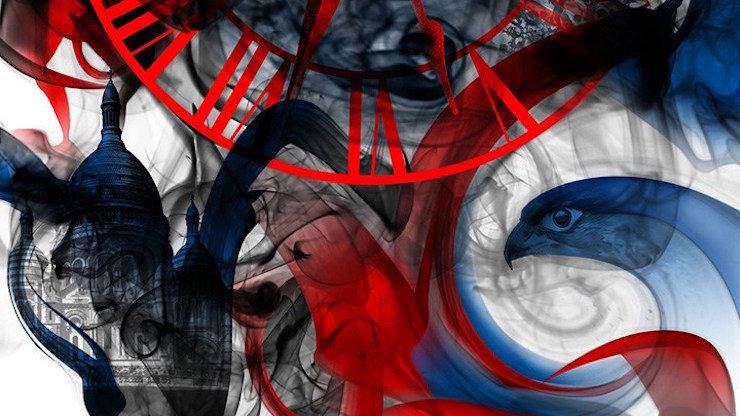I spent eighteen months after university working in Paris, and ever since then the City of Light and the fiction it inspires have been close to my heart. Paris has always been a magnet for artists, both celebrated and struggling. Perhaps most famous were the glitterati visitors of the early twentieth century: Hemingway, the Scott Fitzgeralds, Dalí and Picasso, Josephine Baker and Peggy Guggenheim, to name just a few. And it’s a place ripe with potential for the speculative, from the bohemian revolution—synonymous with absinthe and hallucinogenic visions—to the emergence of the Surrealists. No surprise, then, that this city has also inspired the imaginations of science fiction and fantasy writers.
Here are five examples:
The House of Shattered Wings by Aliette de Bodard
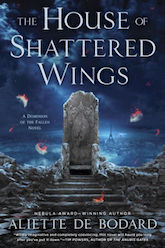 The House of Shattered Wings opens with an angel—one of the Fallen—crashing to Earth. She lands in the wreckage of the Grand Magasins and instantly becomes a target for her essence, an addictive substance harvested through blood, bone and skin: “a jumble of crimson-stained feathers, a tangled mess that seemed to be all broken limbs and bleeding wounds; and, over it all, a gentle sloshing radiance like sunlight seen through water.” Aliette de Bodard’s gothic fantasy of Fallen, magic, and dragons in the Seine explores a post-war Paris where ruined Houses battle it out for supremacy. It’s a superb interrogation of power in all its manifestations, and more explicitly of colonial power and exploitation. Central to this is the character of Philippe—a former Immortal recruited to a foreign army for a war that was never his, now trapped in decaying Paris with little hope of return to his country. He is a protagonist you cannot help but empathise with, but fully capable of morally ambiguous actions. Complexity of character is a strength throughout the novel: de Bodard’s narrative, shifting between different protagonists, illustrates that sometimes there are no good choices, only complicated ones.
The House of Shattered Wings opens with an angel—one of the Fallen—crashing to Earth. She lands in the wreckage of the Grand Magasins and instantly becomes a target for her essence, an addictive substance harvested through blood, bone and skin: “a jumble of crimson-stained feathers, a tangled mess that seemed to be all broken limbs and bleeding wounds; and, over it all, a gentle sloshing radiance like sunlight seen through water.” Aliette de Bodard’s gothic fantasy of Fallen, magic, and dragons in the Seine explores a post-war Paris where ruined Houses battle it out for supremacy. It’s a superb interrogation of power in all its manifestations, and more explicitly of colonial power and exploitation. Central to this is the character of Philippe—a former Immortal recruited to a foreign army for a war that was never his, now trapped in decaying Paris with little hope of return to his country. He is a protagonist you cannot help but empathise with, but fully capable of morally ambiguous actions. Complexity of character is a strength throughout the novel: de Bodard’s narrative, shifting between different protagonists, illustrates that sometimes there are no good choices, only complicated ones.
The Lollipop Shoes by Joanne Harris
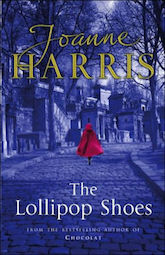 Five years after the events of Chocolat, The Lollipop Shoes catches up with Vianne and Anouk in Paris’s last village, Montmartre. Fleeing the winds, Vianne has renounced the cards and cantrips of her past, and wishes only for a refuge where she can bring up her two daughters in safety—much to the disappointment of Anouk. But the arrival of Zozie de l’Alba on The Day of the Dead marks a return of magic—or of something more mysterious: “There’s no such thing as real magic—and yet it works. Sometimes, it works.” The novel’s subtle treatment of the supernatural is beautifully done: rites and signs are explicit, but it’s the choice of the reader whether to believe in magic as a force in its own right, or to choose an alternative interpretation of events. This liminality is reinforced by the alternating voices of Vianne, Anouk, and the glamourous Zozie, a self-professed collector of individuals and wearer of the eponymous shoes. At its core, The Lollipop Shoes is a novel about the complexities of motherhood and the relationships between mothers and daughters—as Vianne memorably says: “Show me a mother, and I’ll show you a liar.”
Five years after the events of Chocolat, The Lollipop Shoes catches up with Vianne and Anouk in Paris’s last village, Montmartre. Fleeing the winds, Vianne has renounced the cards and cantrips of her past, and wishes only for a refuge where she can bring up her two daughters in safety—much to the disappointment of Anouk. But the arrival of Zozie de l’Alba on The Day of the Dead marks a return of magic—or of something more mysterious: “There’s no such thing as real magic—and yet it works. Sometimes, it works.” The novel’s subtle treatment of the supernatural is beautifully done: rites and signs are explicit, but it’s the choice of the reader whether to believe in magic as a force in its own right, or to choose an alternative interpretation of events. This liminality is reinforced by the alternating voices of Vianne, Anouk, and the glamourous Zozie, a self-professed collector of individuals and wearer of the eponymous shoes. At its core, The Lollipop Shoes is a novel about the complexities of motherhood and the relationships between mothers and daughters—as Vianne memorably says: “Show me a mother, and I’ll show you a liar.”
Picasso at the Lapin Agile by Steve Martin
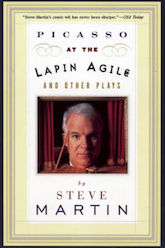 Technically a script, but I couldn’t resist including Steve Martin’s speculative encounter between Albert Einstein and Pablo Picasso, set in 1904 at the Lapin Agile (a cabaret bar located near the Sacre Coeur, still there today). A chance meeting between these juggernauts of science and art in the early days of their careers becomes a playful debate on the nature of creativity and genius. Responding to a challenge to a duel, both characters take up pencils, Picasso produces a drawing and Einstein a formula: both, they claim, are beautiful. The play never takes itself too seriously, and there are moments of delicious comedy – as with one character’s response to Einstein describing his book on relativity, a masterpiece written, but alas, not yet published: “Yeah, well, we’re all writers, aren’t we? He’s a writer that hasn’t been published, and I’m a writer who hasn’t written anything.”
Technically a script, but I couldn’t resist including Steve Martin’s speculative encounter between Albert Einstein and Pablo Picasso, set in 1904 at the Lapin Agile (a cabaret bar located near the Sacre Coeur, still there today). A chance meeting between these juggernauts of science and art in the early days of their careers becomes a playful debate on the nature of creativity and genius. Responding to a challenge to a duel, both characters take up pencils, Picasso produces a drawing and Einstein a formula: both, they claim, are beautiful. The play never takes itself too seriously, and there are moments of delicious comedy – as with one character’s response to Einstein describing his book on relativity, a masterpiece written, but alas, not yet published: “Yeah, well, we’re all writers, aren’t we? He’s a writer that hasn’t been published, and I’m a writer who hasn’t written anything.”
Submission by Michel Houellebecq
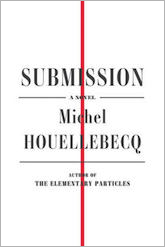 Set in the spring of 2022, the novel centres on an election race between the Front National and the fictional Muslim Fraternity, led by grocer’s son and political moderate Mohammed Ben Abbes, and the resulting conversion of France to a Muslim state. What’s interesting about the book is the very credible depiction of political change, and the swiftness of the transformation. François is a protagonist typical of Houellebecq’s oeuvre: a middle-class academic who has lost interest in almost everything, with a nihilistic view of modern life, its obsession with consumerism and capitalism, and society devoid of faith. Even while observing the zeitgeist, “the widening gap, now a chasm, between the people and those who claimed to speak for them, the politicians and journalists, would necessarily lead to something violent and unpredictable,” the election outcome seems inconceivable to François, a man steeped in the constructs and conventions of western society—never mind the idea that he might turn out to be a beneficiary of the new system. It’s an engaging satire—just try to erase the sex scenes from your mind.
Set in the spring of 2022, the novel centres on an election race between the Front National and the fictional Muslim Fraternity, led by grocer’s son and political moderate Mohammed Ben Abbes, and the resulting conversion of France to a Muslim state. What’s interesting about the book is the very credible depiction of political change, and the swiftness of the transformation. François is a protagonist typical of Houellebecq’s oeuvre: a middle-class academic who has lost interest in almost everything, with a nihilistic view of modern life, its obsession with consumerism and capitalism, and society devoid of faith. Even while observing the zeitgeist, “the widening gap, now a chasm, between the people and those who claimed to speak for them, the politicians and journalists, would necessarily lead to something violent and unpredictable,” the election outcome seems inconceivable to François, a man steeped in the constructs and conventions of western society—never mind the idea that he might turn out to be a beneficiary of the new system. It’s an engaging satire—just try to erase the sex scenes from your mind.
The Last Days of New Paris by China Mieville
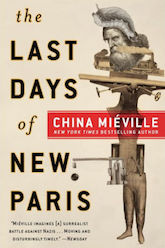 Mieville’s alternative history The Last Days of New Paris delivers the ultimate psychedelic feast. 1941 in occupied-Paris: an S-bomb detonates, resulting in surrealist arts materializing as physical entities which become known to the Parisians as manifs. Fast forward to 1950, the war has not yet ended and a quarantined Paris has become a battleground between the Nazis, the Resistance, the supernatural forces of manifs and demons, and various intelligence agencies—with agents on both sides seeking to manipulate and weaponise the manifs. The strength of the novella lies in its fantastical descriptions and Mieville’s trademark prose, such as the description of the Vélo on the opening pages: “a torso, jutted from the bicycle itself, its moving prow, a figurehead where handlebars should be. She was extruded from the metal. She pushed her arms backward and they curled at the ends like coral.” This is 170 pages of hallucinogenic, at times chilling, and at times unexpectedly moving madness.
Mieville’s alternative history The Last Days of New Paris delivers the ultimate psychedelic feast. 1941 in occupied-Paris: an S-bomb detonates, resulting in surrealist arts materializing as physical entities which become known to the Parisians as manifs. Fast forward to 1950, the war has not yet ended and a quarantined Paris has become a battleground between the Nazis, the Resistance, the supernatural forces of manifs and demons, and various intelligence agencies—with agents on both sides seeking to manipulate and weaponise the manifs. The strength of the novella lies in its fantastical descriptions and Mieville’s trademark prose, such as the description of the Vélo on the opening pages: “a torso, jutted from the bicycle itself, its moving prow, a figurehead where handlebars should be. She was extruded from the metal. She pushed her arms backward and they curled at the ends like coral.” This is 170 pages of hallucinogenic, at times chilling, and at times unexpectedly moving madness.
 E.J. Swift is a speculative fiction writer based in London. Her Osiris Project trilogy (Osiris, Cataveiro, Tamaruq) explores a world radically altered by climate change, from an isolated oceanic city in the grip of a conspiracy, to the sands of the Amazon Desert and the fate of the last jaguar. Her short fiction has been nominated for the Sunday Times EFG short story award (“The Spiders of Stockholm”, Jurassic) and the BSFA award for short fiction (“Saga’s Children”, Jurassic), and has appeared in a variety of publications from Solaris, Jurassic London, NewCon Press, Unsung Stories, and Salt Publishing. Swift also contributed to Strata, an interactive digital project by Penguin Random House. Swift’s latest novel, Paris Adrift, is published in the UK and North America by Solaris. You can find her on twitter and Instagram @catamaroon and on Facebook @ejswiftauthor.
E.J. Swift is a speculative fiction writer based in London. Her Osiris Project trilogy (Osiris, Cataveiro, Tamaruq) explores a world radically altered by climate change, from an isolated oceanic city in the grip of a conspiracy, to the sands of the Amazon Desert and the fate of the last jaguar. Her short fiction has been nominated for the Sunday Times EFG short story award (“The Spiders of Stockholm”, Jurassic) and the BSFA award for short fiction (“Saga’s Children”, Jurassic), and has appeared in a variety of publications from Solaris, Jurassic London, NewCon Press, Unsung Stories, and Salt Publishing. Swift also contributed to Strata, an interactive digital project by Penguin Random House. Swift’s latest novel, Paris Adrift, is published in the UK and North America by Solaris. You can find her on twitter and Instagram @catamaroon and on Facebook @ejswiftauthor.










